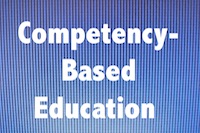Two professors’ experience with competency‐based education
 In the autumn of 2015, to extend its leadership in science, technology, engineering, and mathematics (STEM) education and to reach a wider range of lifelong learners, Worcester Polytechnic Institute embarked upon a pilot program to assess the value of a competency‐based education (CBE) pedagogy. The authors converted two graduate‐level Systems Engineering courses to a CBE format and delivered them to students in late 2016 and 2017. Preliminary results suggest that CBE offers increased flexibility for working professionals and can extend the reach of educational institutions; that the choice of a learning management system is critical in facilitating CBE delivery; that some students adapt to a CBE format very well while others (who do not have good self‐discipline) do not, so that identifying the correct target demographic is important; that working in project teams is difficult in a CBE context; that synchronous activities (such as Discussion Board postings requiring synchronous debate) are challenging; that (in the version of CBE offered) most students did not avail themselves of the substantial flexibility provided in selecting course topics and alternative assessments; and that unless incentivized to move quickly, students tend to procrastinate. Lastly, for CBE to be financially beneficial to both student and university, it is our opinion that careful attention must be paid to the choice of students, the selection of courses, and the choice of business model, all of which are intimately tied together. These preliminary observations must be corroborated or refuted in future pilots, which are currently planned to develop improved versions of CBE at Worcester Polytechnic Institute.
In the autumn of 2015, to extend its leadership in science, technology, engineering, and mathematics (STEM) education and to reach a wider range of lifelong learners, Worcester Polytechnic Institute embarked upon a pilot program to assess the value of a competency‐based education (CBE) pedagogy. The authors converted two graduate‐level Systems Engineering courses to a CBE format and delivered them to students in late 2016 and 2017. Preliminary results suggest that CBE offers increased flexibility for working professionals and can extend the reach of educational institutions; that the choice of a learning management system is critical in facilitating CBE delivery; that some students adapt to a CBE format very well while others (who do not have good self‐discipline) do not, so that identifying the correct target demographic is important; that working in project teams is difficult in a CBE context; that synchronous activities (such as Discussion Board postings requiring synchronous debate) are challenging; that (in the version of CBE offered) most students did not avail themselves of the substantial flexibility provided in selecting course topics and alternative assessments; and that unless incentivized to move quickly, students tend to procrastinate. Lastly, for CBE to be financially beneficial to both student and university, it is our opinion that careful attention must be paid to the choice of students, the selection of courses, and the choice of business model, all of which are intimately tied together. These preliminary observations must be corroborated or refuted in future pilots, which are currently planned to develop improved versions of CBE at Worcester Polytechnic Institute.







